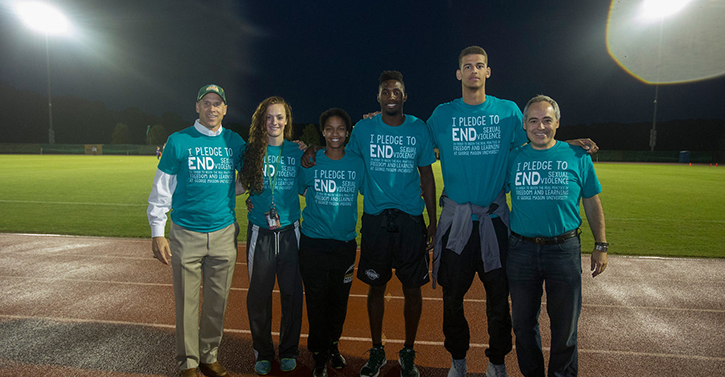
Athletic Director Brad Edwards, left, and President Ángel Cabrera, right, pose with students wearing pledge T-shirts, indicating that they took a pledge to end sexual violence, at a men's soccer game against the University of Virginia. File photo/Creative Services
For Professor Angie Hattery, director of Women and Gender Studies at George Mason University, the upcoming “Chapter Next” event to end campus sexual violence could not come at a better time.
With the Senate Judiciary Committee hearings into the alleged sexual misconduct of then-Supreme Court nominee Brett Kavanaugh while he was in high school and college still fresh in people’s minds, the program should resonate even more.
The event will be in Dewberry Hall on the Fairfax Campus on Thursday, Oct. 18, from 4 to 6 p.m. Primary sponsors are Women and Gender Studies Program, Mason’s Student Support Advocacy Center and Leadership Education and Development (LEAD).
“I hope it does resonate, and I think it’s fair to say this is more important than ever,” Hattery said. “Come find out what your campus commitments are. Come find out what your campus policies are. Come and learn more about what Mason’s commitment is to this.”
It’s also a chance to renew the pledge the campus community made four years ago to end campus sexual violence.
“Chapter Next” has two purposes, Hattery said: to raise awareness about the collateral consequences to those who have experienced sexual violence, and to examine what’s next for the campus community as it builds on the pledge from four years ago.
Programming will explain how sexual or interpersonal violence can cause students to change majors or drop out of school. It can even cause financial difficulties or cause some to become food insecure, Hattery said, which spotlights why campus services such as the Patriot Pantry are so important.
Mason administrators will also speak on and build upon President Ángel Cabrera’s recent campuswide message that stated, “As a university committed to education and prevention, we are aware of the impact of sexual violence on victims of assault. . . . Together we’ve worked to build awareness, establish services, strengthen protocols and expand training.”
As for the renewed pledge to end campus sexual violence, Courtney Diener, assistant director of interpersonal violence in the Student Support and Advocacy Center, said it really is a call to action.
“It’s not just a pledge that people sign,” she said. “It’s something people are looking at and trying to get involved with and making sure they are part of the conversation. In that way Mason has done a fantastic job of cultivating a space where we can talk about prevention and supporting survivors.”
“What we’re hoping,” Diener added, “is that this event will engage people and allow them to really commit; go to an event, put on one of their own or even just challenge a joke that happens if it’s around those who have experienced sexual violence. Hopefully it’s an ignition to continue the work.”
Mason has many resources to help those who have experienced sexual or interpersonal violence:
Counseling and Psychological Services, 703-993-2380, caps.gmu.edu
Office of Student Conduct, 703-993-6209, studentconduct.gmu.edu
Student Support and Advocacy Center, 703-993-3686, ssac.gmu.edu
Title IX Office, Compliance, Diversity and Ethics, 703-993-8730, cde.gmu.edu
University Police and Public Safety, 703-993-2810, police.gmu.edu
https://diversity.gmu.edu/sexual-misconduct
